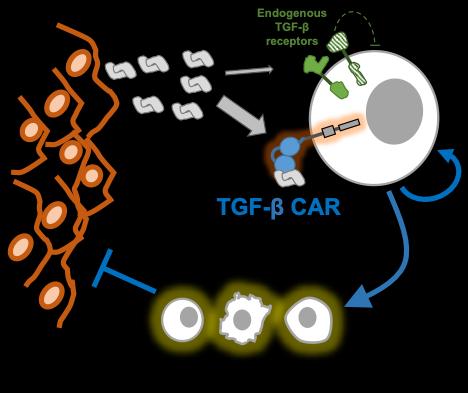Solid tumors are notoriously hard to treat with immunotherapy, but new research provides a target for disarming these cancers and ramping up the immune response against them

Credit: Image courtesy of ZeNan Chang.
SAN DIEGO, CA – Yvonne Chen engineers immune cells to target their most evasive enemy: cancer. New cancer immunotherapies generate immune cells that are effective killers of blood cancers, but they have a hard time with solid tumors. Chen, Associate Professor at the University of California, Los Angeles (UCLA) and a member of the Jonsson Comprehensive Cancer Center, is designing ways for immune cells to “outsmart” solid tumors. She will present her research on Tuesday, February 18, at the 64th Annual Meeting of the Biophysical Society in San Diego, California.
T cells, which are a type of white blood cells, patrol and attack invaders to our bodies, but they also need to avoid assault on our own cells, which is one of the ways cancers are able to “hide” from the immune system. Solid tumors, cancers that form a mass in the body, make up 90% of cancer cases and can even inactivate immune cells. These tumors can surround themselves in a protein called transforming growth factor beta (TGF?β), which suppresses the activity of T cells in the tumor environment. Chen found a way to help T cells turn TGF?β back on tumor cells.
T cells can be engineered to produce receptors known as chimeric antigen receptors (CARs), which are designed to recognize tumor-associated proteins known as antigens. Upon encountering cells that present the target antigen, CAR-T cells can latch onto the target cell and kill it. T cells engineered to express CARs that target CD19, an antigen found on B cells, have been approved by the FDA for the treatment of B-cell leukemia and lymphoma.
Although CD19 CAR-T cell therapy has shown promising clinical results, sometimes through the course of treatment, a population of cancer cells without CD19 emerge. “Clinical trials have shown that 50% of lymphoma patients treated with CD19 CAR-T cell therapy would relapse within 6 months, and many of those cases involve tumor cells that no longer express CD19,” Chen said. To circumvent this, Chen engineered T cells that target both CD19 and CD20, reducing the possibility that any cancer cells will evade treatment. This bispecific CAR-T cell therapy is now being tested in a phase-1 clinical trial at UCLA.
In addition to blood cancers, solid tumors have been the focus of much ongoing research activity in the Chen Lab. “Immunotherapy works well against blood tumors, but hasn’t worked as well against solid tumors, in part because of TGF?β-induced immunosuppression,” Chen said. Her new approach with a CAR engineered against TGF?β is a promising start targeting solid tumors. “TGF?β CAR has shown the potential to safely and effectively boost the anti?tumor efficacy of T?cell therapy.”
Chen and colleagues made CARs that respond to TGF?β by ramping up their defenses. “Instead of responding to TGF?β by shutting down, T cells that express the TGF-β-responsive CAR would be geared up to encounter and attack a tumor cell when exposed to high concentrations of TGF-β,” Chen said. Chen and colleagues are developing TGF-β CAR-T cells that also target another tumor-specific marker, in order to develop a next-generation T cell therapy that can effectively combat immunosuppressive solid tumors.
###
Media Contact
Leann Fox
[email protected]
202-256-1417
Original Source
https:/




